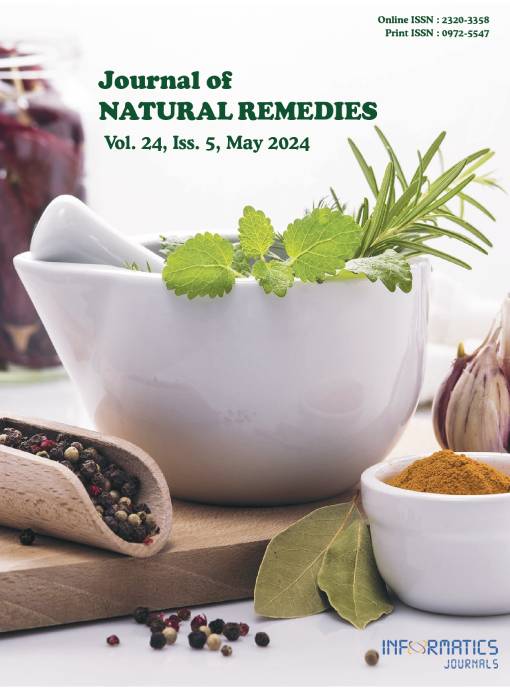Ayurvedic Management of Hepatocellular Jaundice – A Case Report
DOI:
https://doi.org/10.18311/jnr/2024/34552Keywords:
Hepatocellular Jaundice, Kamala, Nitya virechan, Shamana, ShodhanaAbstract
Jaundice is a yellow discolouration of the skin, another mucous membrane and the conjunctival membrane surrounding the sclera. It is a clinical symptom of either underlying hepatocellular dysfunction biliary obstruction or anomalies of bilirubin metabolism. This clinical entity can be compared with Kamla as described in Ayurveda. The strength of Ayurveda in treating jaundice should be emphasised. This is a case report of a 24-year-old male patient who visited Kayachikitsa out-patient department with the chief complaints of Agnimandya (reduced appetite), Chardi (vomiting), Udarashool (pain in the abdomen), Hrullas (nausea), Peet varniya Netra (yellow discolouration of eyes), Daurbalya (lassitude), Vibhandha (constipation) for seven days. The patient was effectively treated with mild shodhana (bio-purification) with Nitya virechana (purgation therapy) followed by medicinal treatment for 30 days. After 4-5 days, there was a significant improvement in all clinical features and a substantial improvement in liver function. The treatment was given by considering the vitiation of Pitta and Rakta. It can be concluded that this disease was managed and liver functions were improved by ayurvedic management.
Downloads
Metrics
Downloads
Published
How to Cite
Issue
Section
License
Copyright (c) 2024 Pankaj Yadav, Vaishali Kuchewar, Tanika Yadav, Aman Chhabra (Author)

This work is licensed under a Creative Commons Attribution 4.0 International License.
Accepted 2024-03-07
Published 2024-05-01
References
Schwarzenbach HR. Jaundice and pathological liver values. Praxis. 2013; 102(12):727-9. https://doi.org/10.1024/1661-8157/a001333. PMid:23735764.
Johnston M, Ravindran RR. Jaundice. Surgery (Oxford). 2023 Apr 10.https://doi.org/10.1016/j.mpsur.2023.02.019.
Singh A, Koritala T, Jialal I. Unconjugated hyperbilirubinemia. 2022 Apr 2. Stat Pearls [Internet]. Treasure Island (FL): StatPearls Publishing. 2022.
Astanga Hridaya, edited by Dr. Brahmanand Tripathi, Chaukhambha Sanskrit Pratishthan, Reprinted. Nidan sthana. 2015; 13/15-17; p. 520.
Astanga Hridaya, edited by Dr. Brahmanand Tripathi, Chaukhambha Sanskrit Pratishthan, Reprinted 2015, Nidan sthana, chp13/15-17, p. 520.
Ravidatta Tripathi, Charak Samhita, Sutrasthan 28, Vividhashitapitiya adhyay, edition reprinted 2009, published by Chaukhamba Surbharti prakashan Varanasi, pg no. 430.
Susruta-Samhita, edited by Priyavrat Sharma, Chaukhamba Visvabharati,3 Uttaratantra, 44(10). Reprinted 2013. p. 450.
Yadav N, Singh AK. Applied aspect of Ashtasthana Pariksha wsr to tools used in current era. Journal of Ayurveda and Integrated Medical Sciences. 2022; 7(8):46-53.
Susruta-Samhita, edited by Priyavrat Sharma, Chaukhamba Visvabharati; 3 Uttaratantra, chp- 44(10). Reprinted 2013. p. 452.
Ayush Kumar Garg, Amit Singh, Harish Vishnoi, Chandan Singh, Manoj Kumar Adlakha. Traditional dietary pattern of Indian food and its scientific basis: An overview. Ayushdhara, 2016; 4(1):983-5.
Varsakiya J, Goyal M, Kumari R, Kathad D. Role of Ayurveda treatment in the management of hepatitis B (Ubhayapatha Ashrita Swatantra Kamala) - A case report. AYU. 2022; 43(1):13-7. https://doi.org/10.4103/ayu.ayu_17_21 PMid:37554413 PMCid: PMC10405884.
Yadav P, Kuchewar V, Yadav T. Management of adverse effects of chemotherapy in ovarian cancer through Ayurveda: A case report. Journal of Clinical and Diagnostic Research.2023; 17(12):4-6. https://doi.org/10.7860/JCDR/2023/66789.18834
Ravidatta Tripathi.Charak Samhita, Sutrasthan 28, Vividhashitapitiya Adhyay, published by Chaukhamba Surbharti prakashan Varanasi, edition reprinted 2009. p. 430.
Chaturvedi A, Nath G, Yadav VB, Antiwal M, Shakya N, Swathi C, Singh JP. A clinical study on virechana karma (therapeutic purgation) over the gut flora with special reference to obesity. Ayu. 2019; 40(3):179. https://doi.org/10.4103/ayu.AYU_302_19 PMid:33281395 PMCid: PMC7685265.
Pal S, Ramamurthy A, Mahajon B. Arogyavardhini Vati: A theoretical analysis. J Int Sci Research. 2016; 5(6):225-7. https://doi.org/10.31254/jsir.2016.5605.
www.ayurmedinfo.com › 2019/04/05 › livomyn-tablet
Nirmal Kumar et al. Phalatrikadi kvatha - An ayurvedic hepatoprotective drug, Int J Res Pharm Chem. 2013; 3(3):591-4.

 Pankaj Yadav
Pankaj Yadav









 0.35
0.35 24
24 0.161
0.161